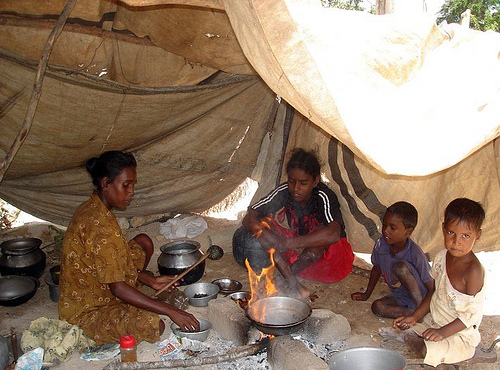Ilankai Tamil Sangam29th Year on the Web Association of Tamils of Sri Lanka in the USA |
|||||
 Home Home Archives Archives |
Fickle Friends, Approval for WarRuling coalition secures victory in a referendum on the warby Peter Ratnadurai, August 24, 2008
SOUTHERN Sri Lanka is gripped by the sort of war euphoria that has not been seen in this part of the world for almost a decade. In 1999, the then President, Chandrika Kumaratunga, secured a second six year term in office by opting for war over peace. Almost a decade on , the ruling regime has acquired a thumping victory at local provincial polls; President Mahinda Rajapaksa claims this to be "people's mandate given to the 'Mahinda Chinthana'."
Mahinda Rajapaksa's regime is not presenting anything new to the people of Sri Lanka. To the Tamils, it is offering what J.R. Jeyawardana, then President, said at the immediate aftermath of the 1983 anti-Tamil riots: "If it is peace let it be peace, if it is war let it be war." To the Sinhalese, the promise is no different from that of Ms Kumaratunga: "We will finish the war before the end of this year." Regurgitated contents in the 'Mahinda Chinthana' has takers from both sides. Some sections of the Tamil community are willing to put up their rights to self-governance on wholesale, as they did in 1983, in fear for dear life. Likewise, as the election results show, there are still large sections of the Sinhala community that believe in a military solution to the ethnic conflict. By conservative estimates, the current Rajapaksa regime has poured a record $1.5 billion into this year's war effort. With such huge expenditure, the military is achieving at least a portion of what is expected of it. The government, which approved the budget, is rightly making political capital out of the "military victories". If only the Sinhala people were not so fickle, they would remember that, as late as the turn of the century, they heard all the same tough talk; seen all the record-breaking military spending; and partied at the capture of many Tamil towns and cities. Should sanity prevail, they would realise that doing the same thing over and over again, be it on a larger scale, will not produce fundamentally different results. What both Tamils and Sinhalese want is a stable island where all the people that inhabit it are afforded the opportunities to achieve their maximum potential; an ideal that can only be built on a backbone of "rights". To begin with, people should have the rights to life, land and livelihood. Thereafter, people need rights to education, employment, and most importantly freedom, a manifestation of which is the right to self-determination. Uprooting thousands of people from their homes may facilitate banner headlines of hundreds of square kilometres captured from the "enemy", but the long term consequences of turning the likes of the Mannar rice bowl into a husk of destitution will be profound. When more than 500, 000 Tamils were sent packing from their homes in the mid-90s, there were plenty of cake-cuttings and fireworks in the South. A section of that half a million then returned in ceaseless waves to humiliate the Sri Lankan military into its worst-ever defeats. Future direction should, at least to a certain extent, be based on the lessons learnt from past experiences. The Sri Lankan state and the Sinhala people whom it serves ought to come to terms with the fruits of 30 years of lessons: for the island to be stable, people's grievances need to be addressed and aspirations need to be respected. Only those who have no knowledge of the history of Sri Lanka's conflict would believe in a military solution that bypasses the long suffering Tamils.
| ||||
